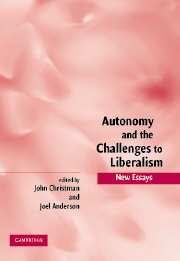Book contents
- Frontmatter
- Contents
- Contributors
- Preface
- Autonomy and the Challenges to Liberalism
- 1 Introduction
- PART I THE SELF: CONCEPTIONS OF THE AUTONOMOUS SELF
- 2 Decentralizing Autonomy: Five Faces of Selfhood
- 3 The Self as Narrator
- 4 Autonomy and Self-Identity
- PART II THE INTERPERSONAL: PERSONAL AUTHORITY AND INTERPERSONAL RECOGNITION
- PART III THE SOCIAL: PUBLIC POLICY AND LIBERAL PRINCIPLES
- PART IV THE POLITICAL: LIBERALISM, LEGITIMACY, AND PUBLIC REASON
- Bibliography
- Index
4 - Autonomy and Self-Identity
Published online by Cambridge University Press: 02 December 2009
- Frontmatter
- Contents
- Contributors
- Preface
- Autonomy and the Challenges to Liberalism
- 1 Introduction
- PART I THE SELF: CONCEPTIONS OF THE AUTONOMOUS SELF
- 2 Decentralizing Autonomy: Five Faces of Selfhood
- 3 The Self as Narrator
- 4 Autonomy and Self-Identity
- PART II THE INTERPERSONAL: PERSONAL AUTHORITY AND INTERPERSONAL RECOGNITION
- PART III THE SOCIAL: PUBLIC POLICY AND LIBERAL PRINCIPLES
- PART IV THE POLITICAL: LIBERALISM, LEGITIMACY, AND PUBLIC REASON
- Bibliography
- Index
Summary
Introduction
In discussions of autonomous agency, much attention is paid to the psychological, social, and historical conditions the autonomous person must satisfy, and to the various epistemic and metaphysical phenomena that might jeopardize these conditions. Discussants assume, in ascribing autonomy to individuals, a “self” that is capable of acting, that this self has a coherent and sustained identity over time, and that the actor is “truly” or “deeply” herself in acting. A capacity for unimpaired critical self-reflection is included in standard accounts of autonomy as well. The task of self-reflection is to appraise aspects of a person's self, such as cognitive, affective, valuational, and dispositional states, as well as personal commitments, social roles, and ideals, to determine if these are components of the person's life with which the person “wholeheartedly identifies” or embraces without reservation so as to render them “authentic” to her.
Accounts of autonomous agency vary in the details. For example, defenders of a liberal conception of autonomy might disagree about the nature of authenticity. Other philosophers repudiate all such depictions of the autonomous self on the grounds that they falsify the nature of the self, and the conditions of its identity and authenticity. Among postmodernists, for example, the charge arises that the assumption of a coherent self misrepresents persons in presupposing a permanency of identity, where in fact the identity of persons is pliant.
- Type
- Chapter
- Information
- Autonomy and the Challenges to LiberalismNew Essays, pp. 77 - 98Publisher: Cambridge University PressPrint publication year: 2005
- 22
- Cited by



